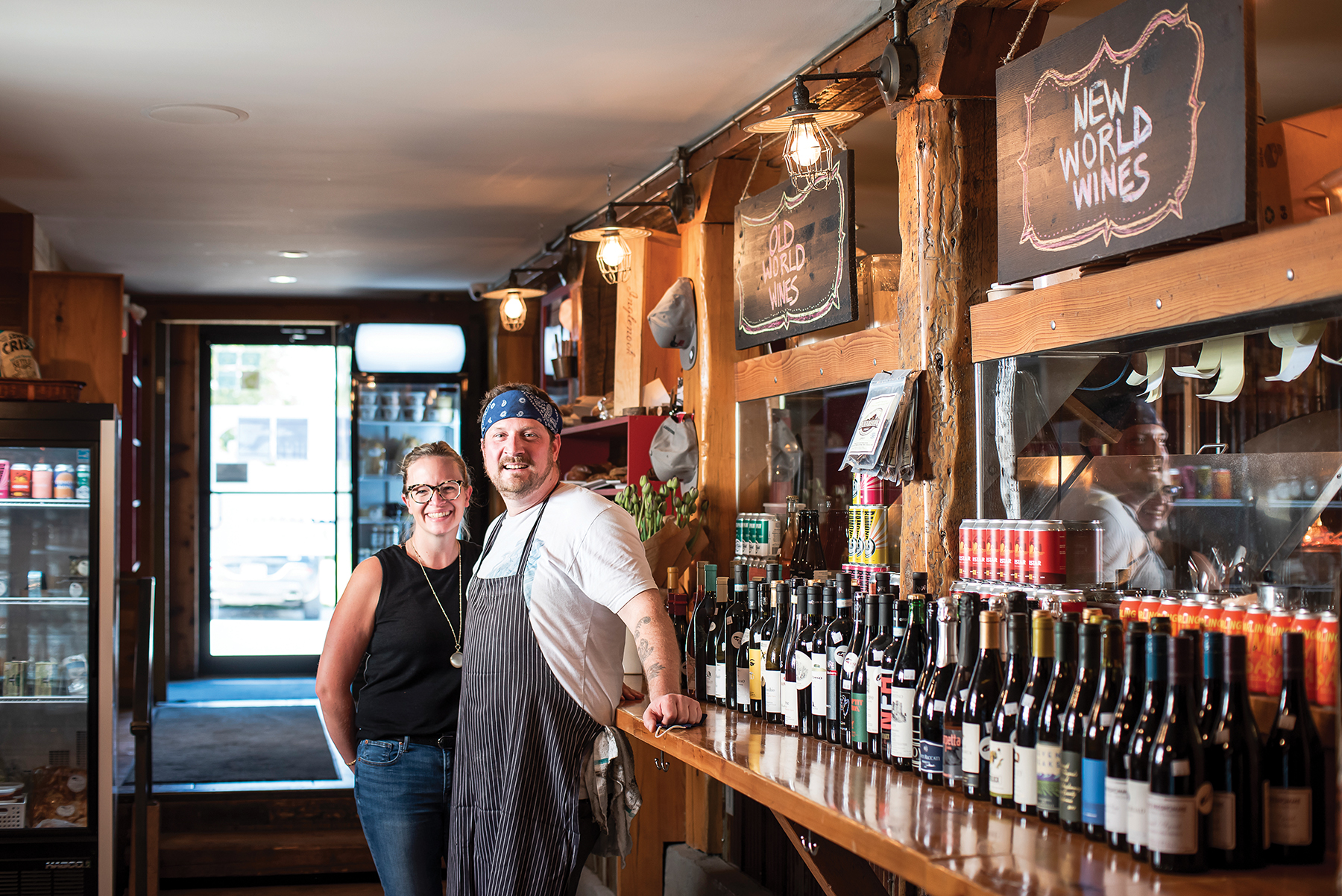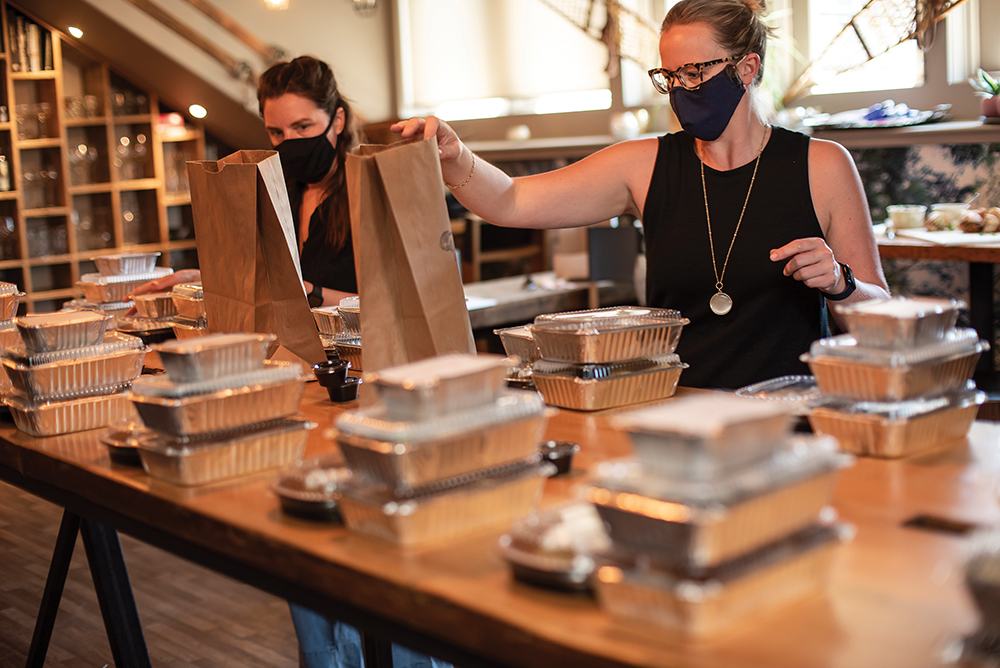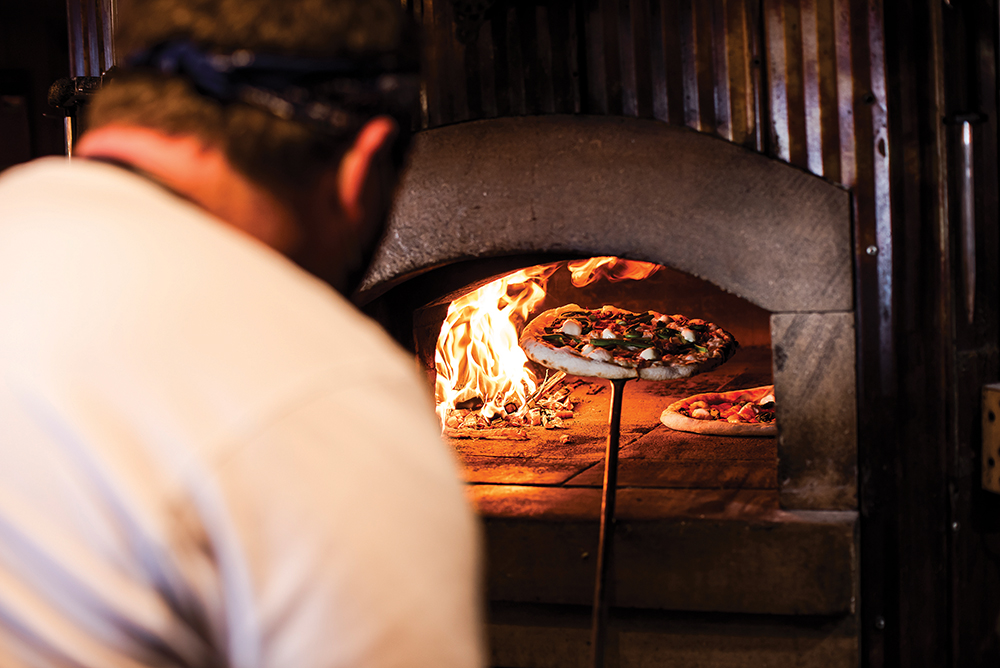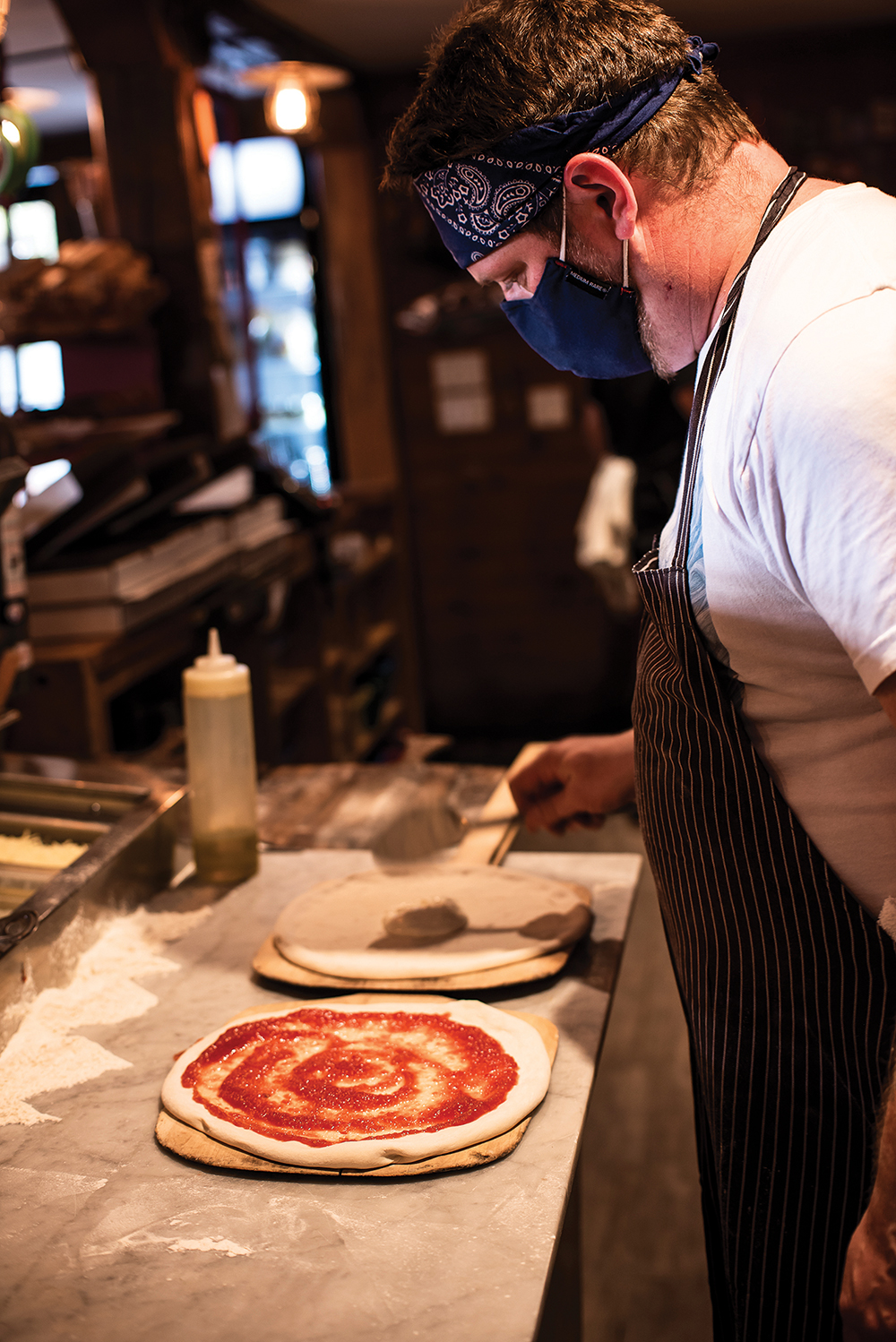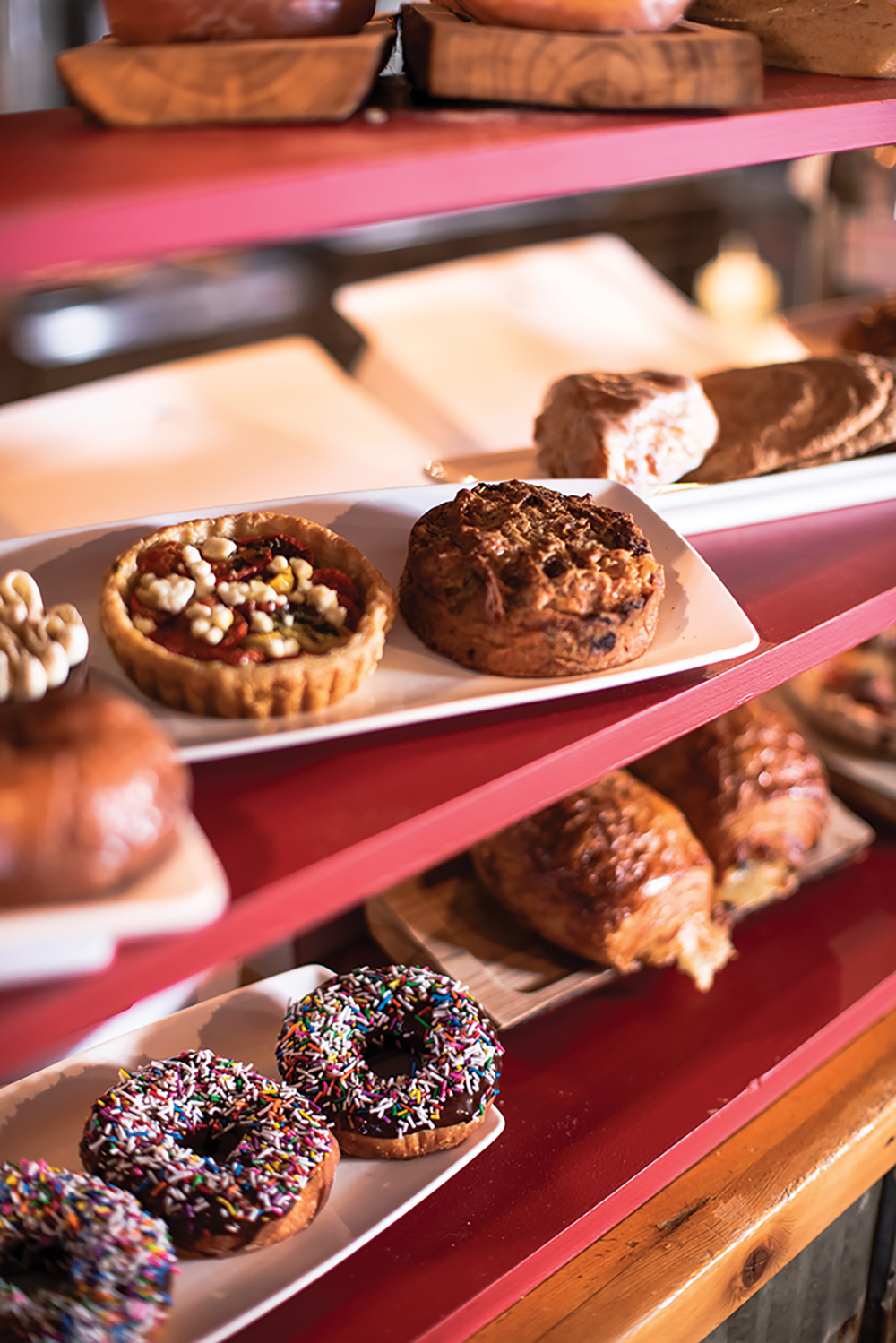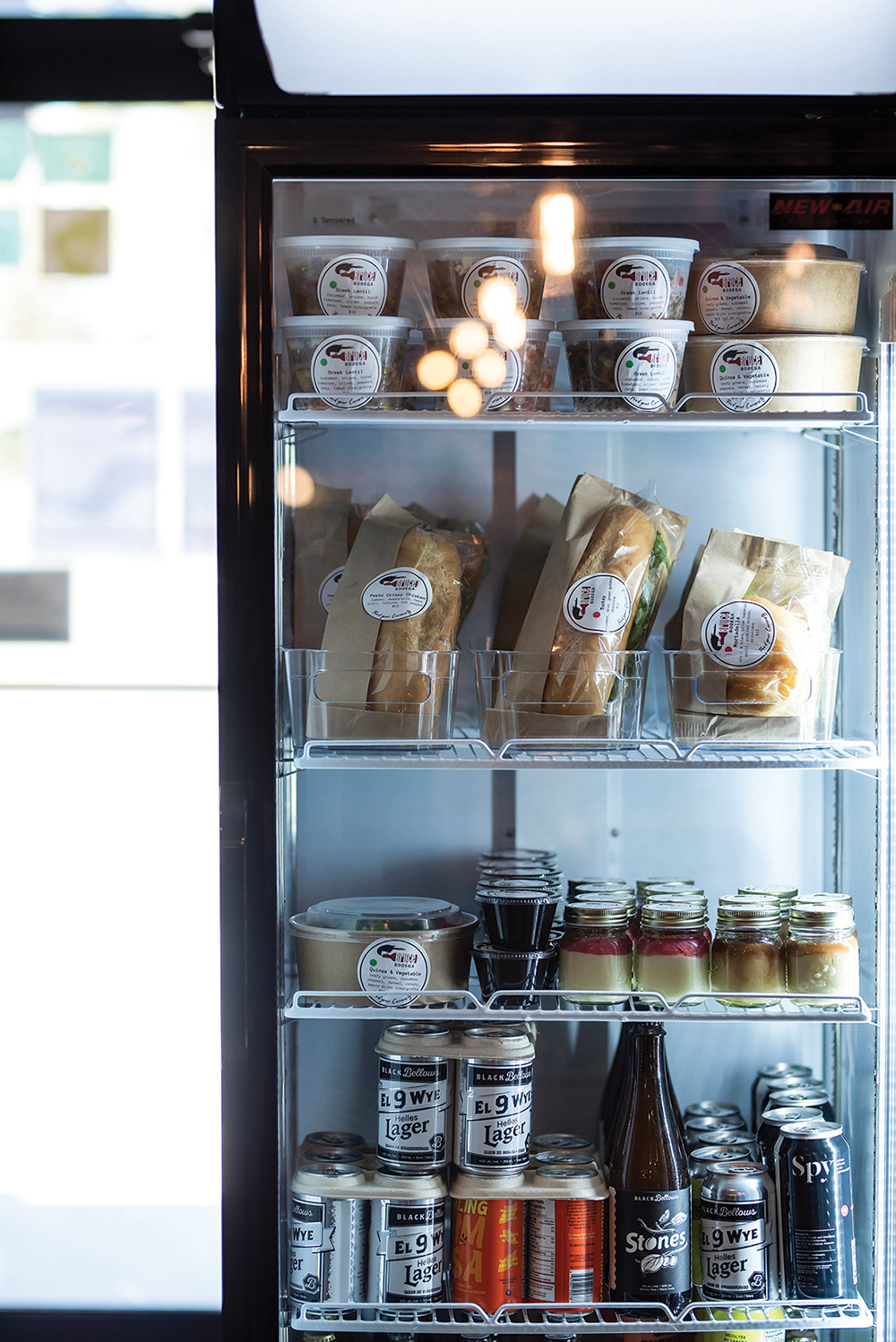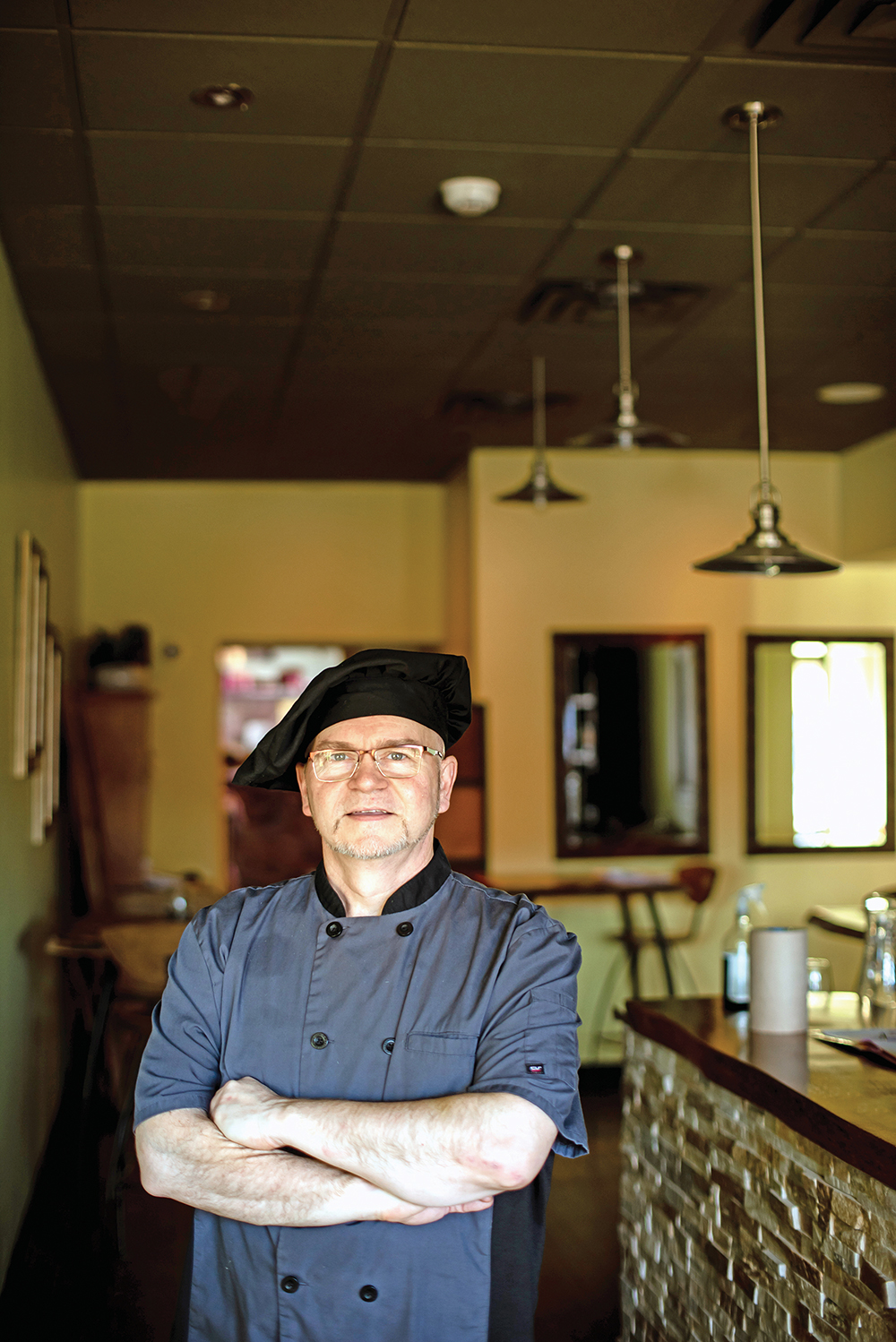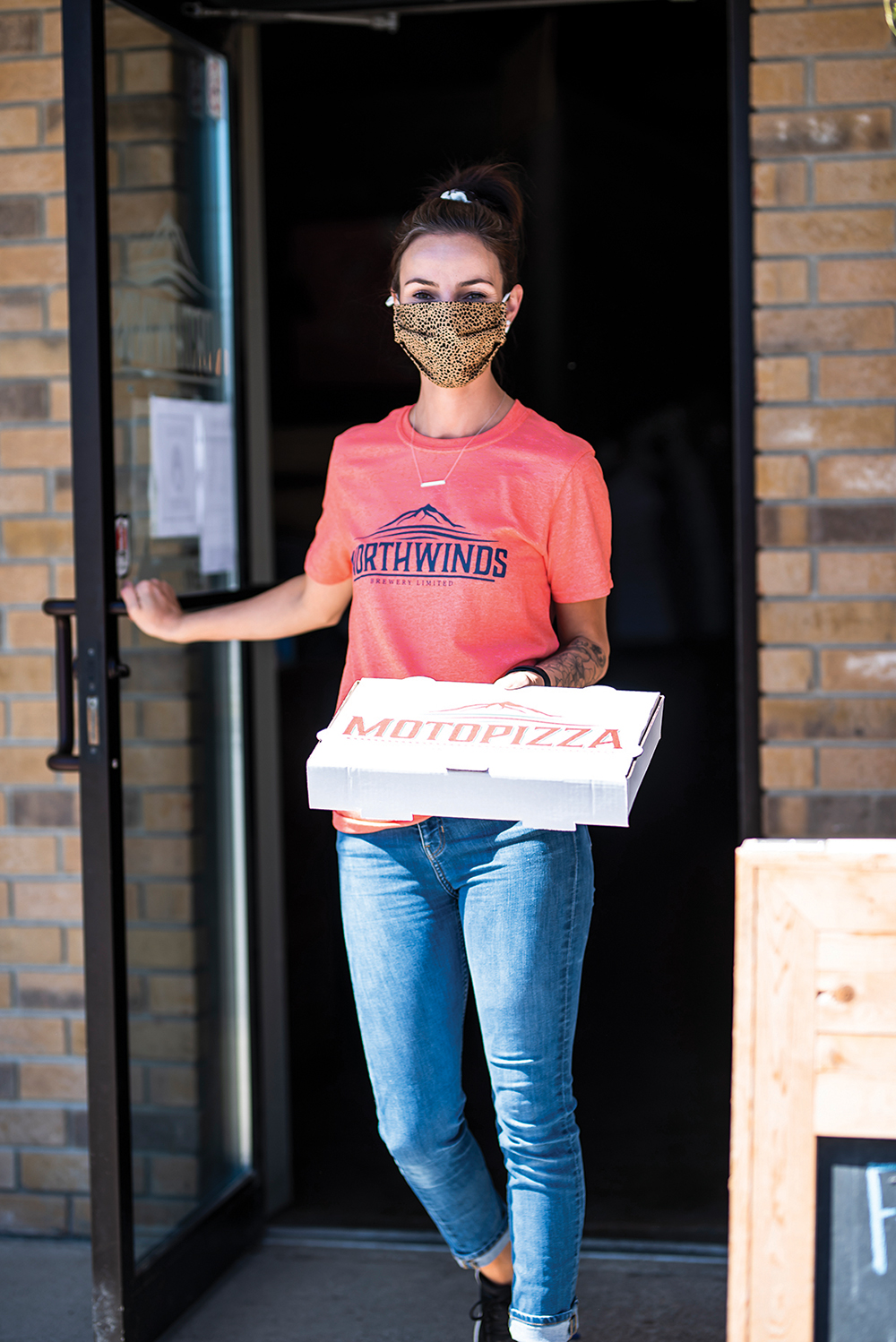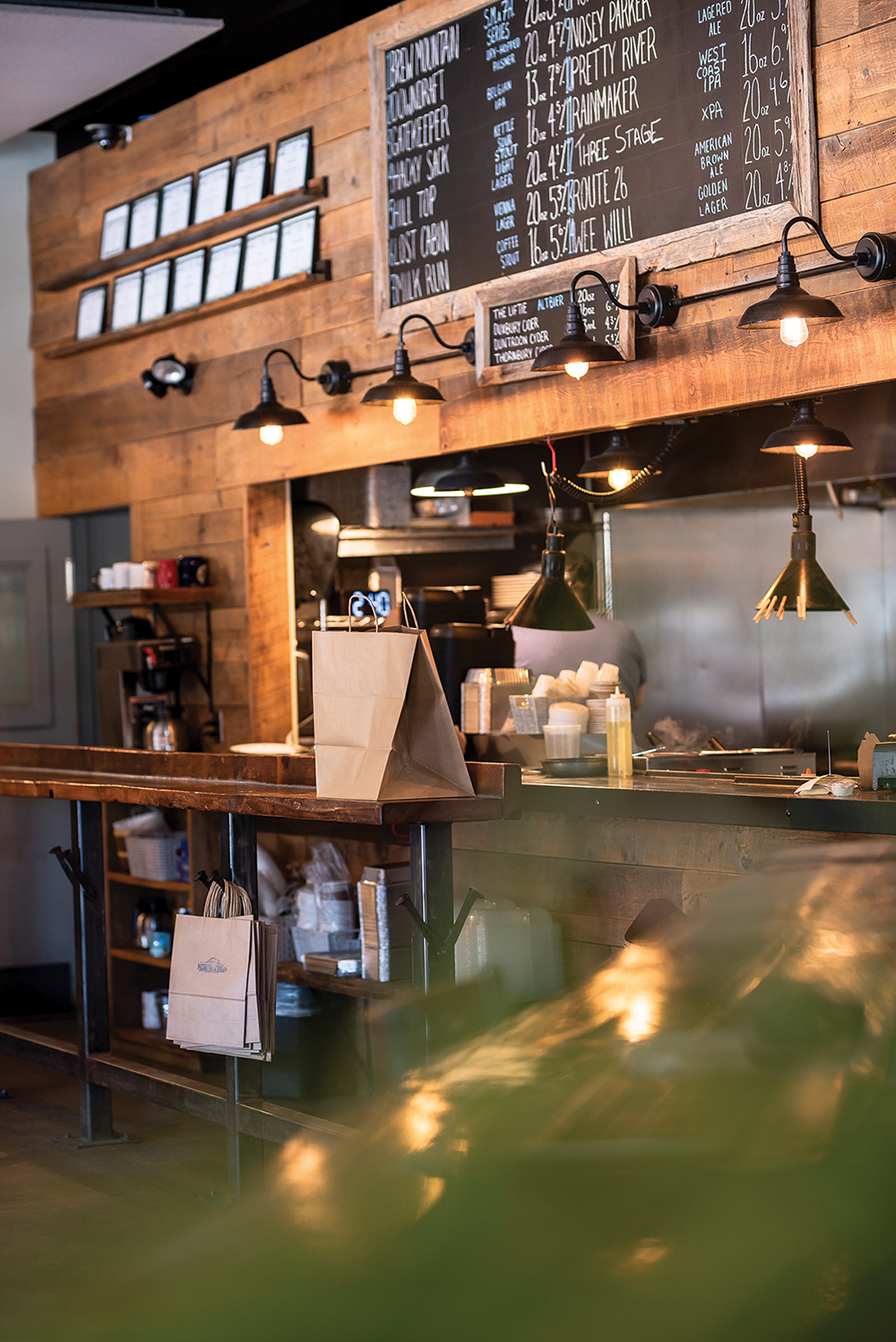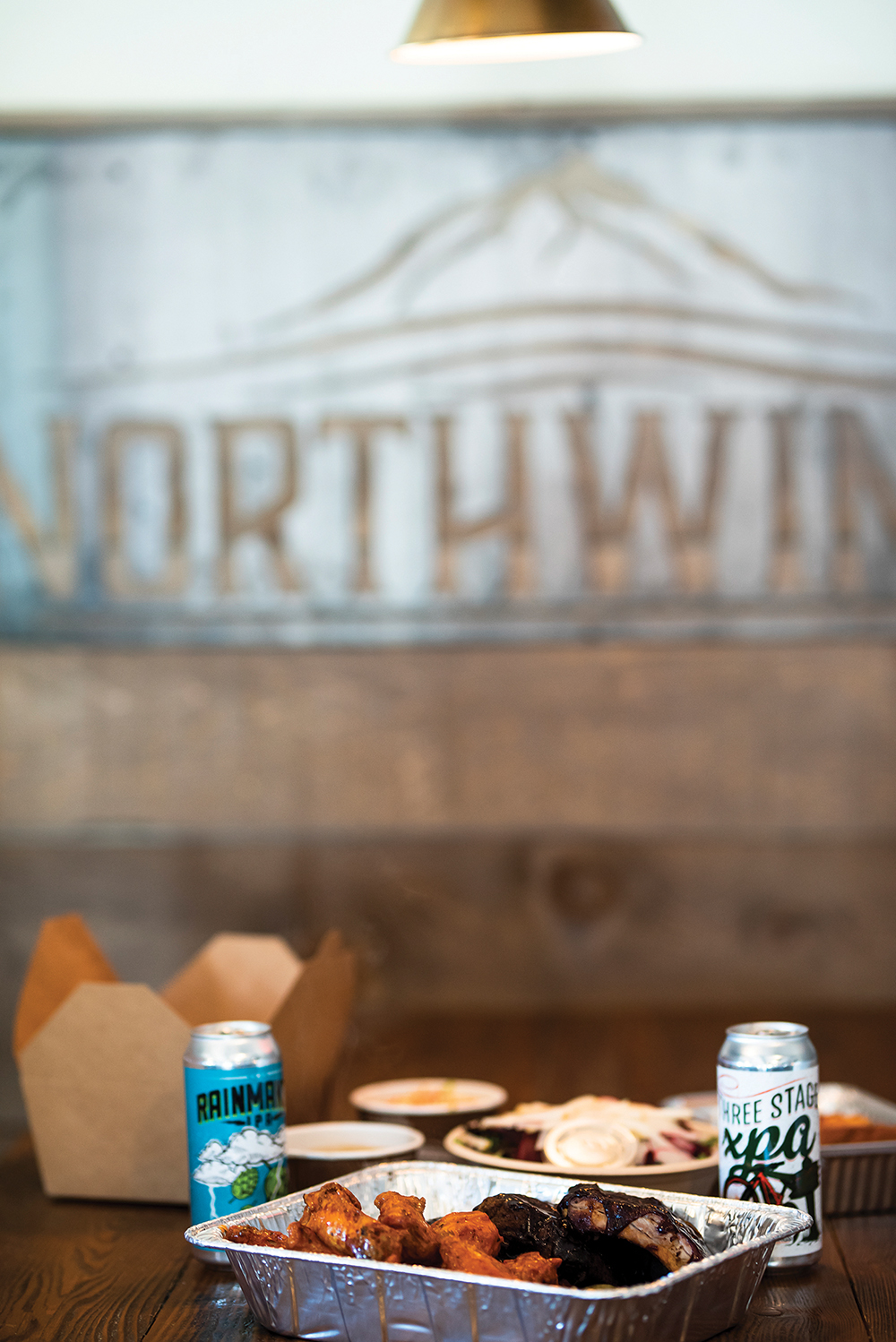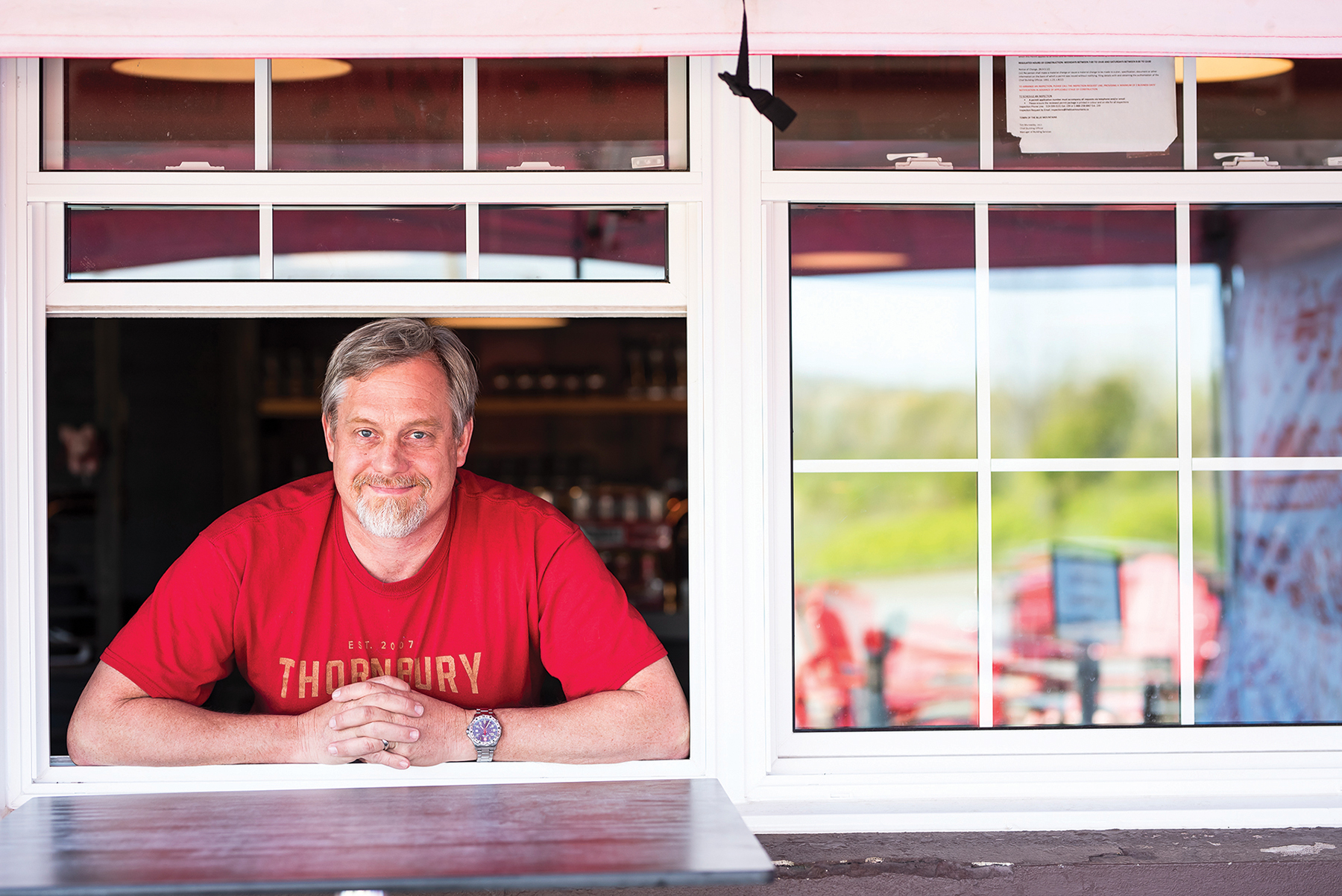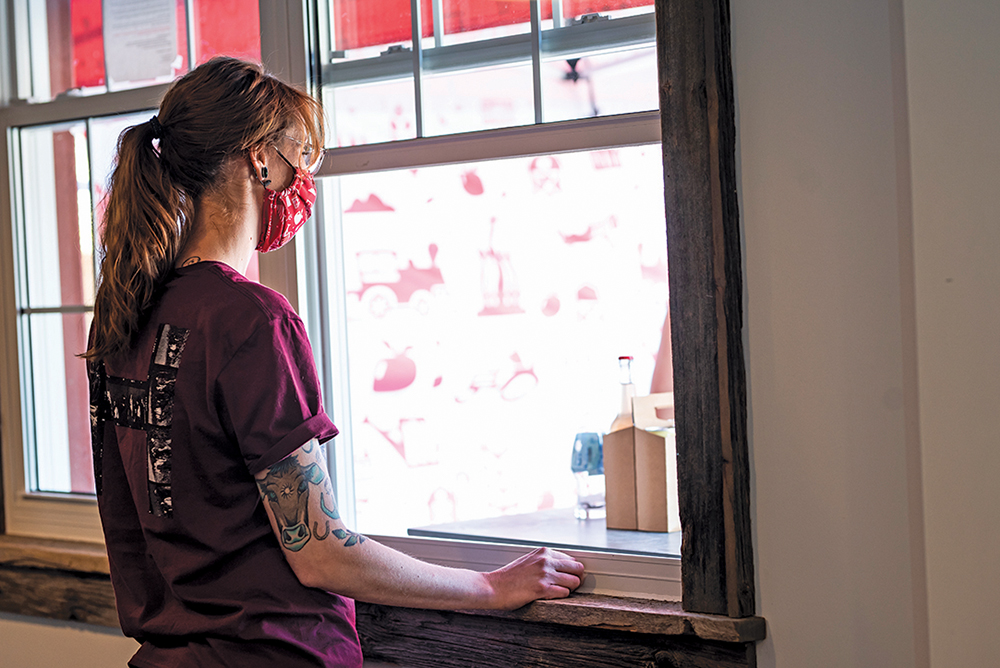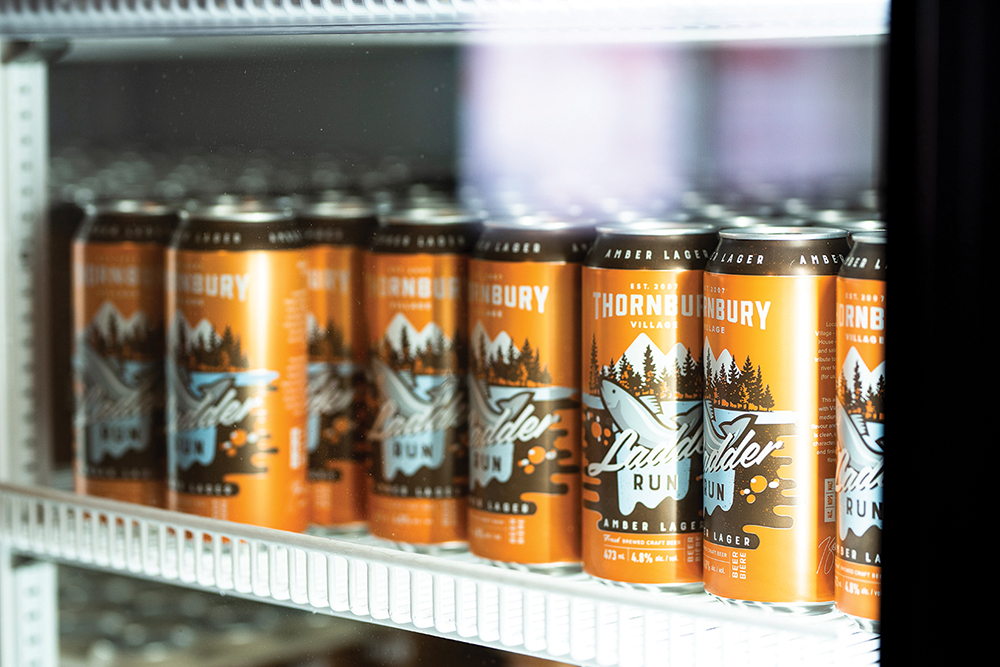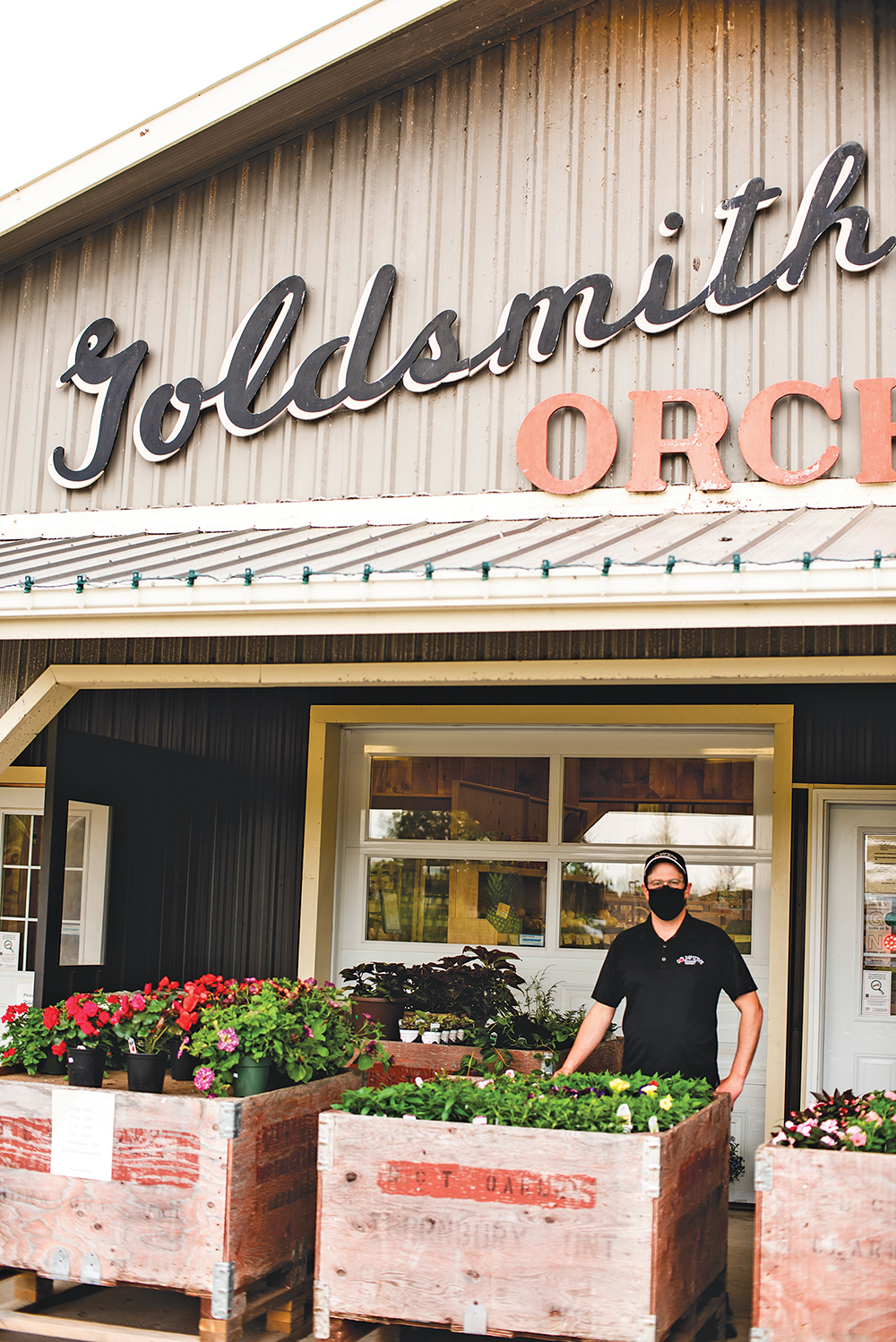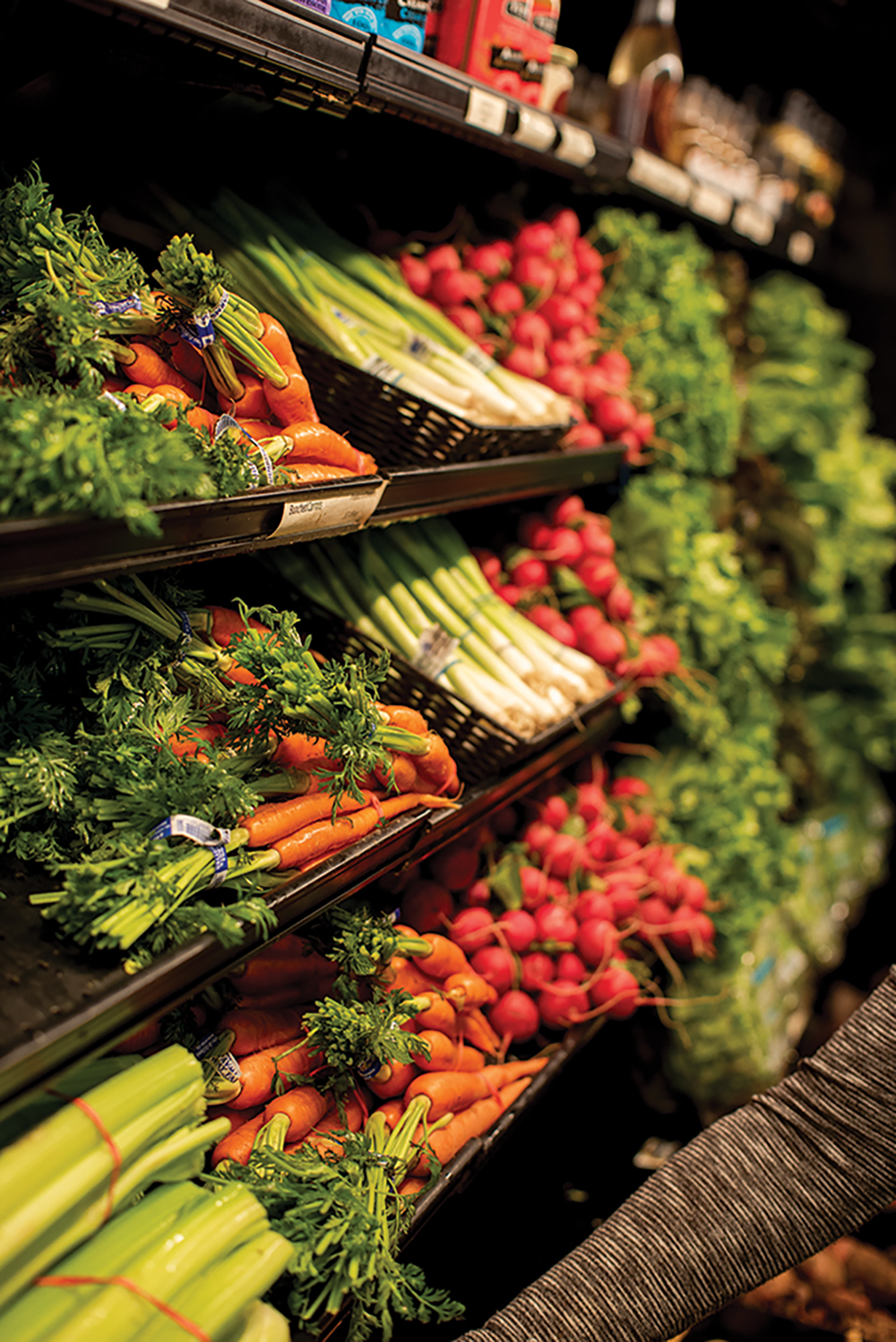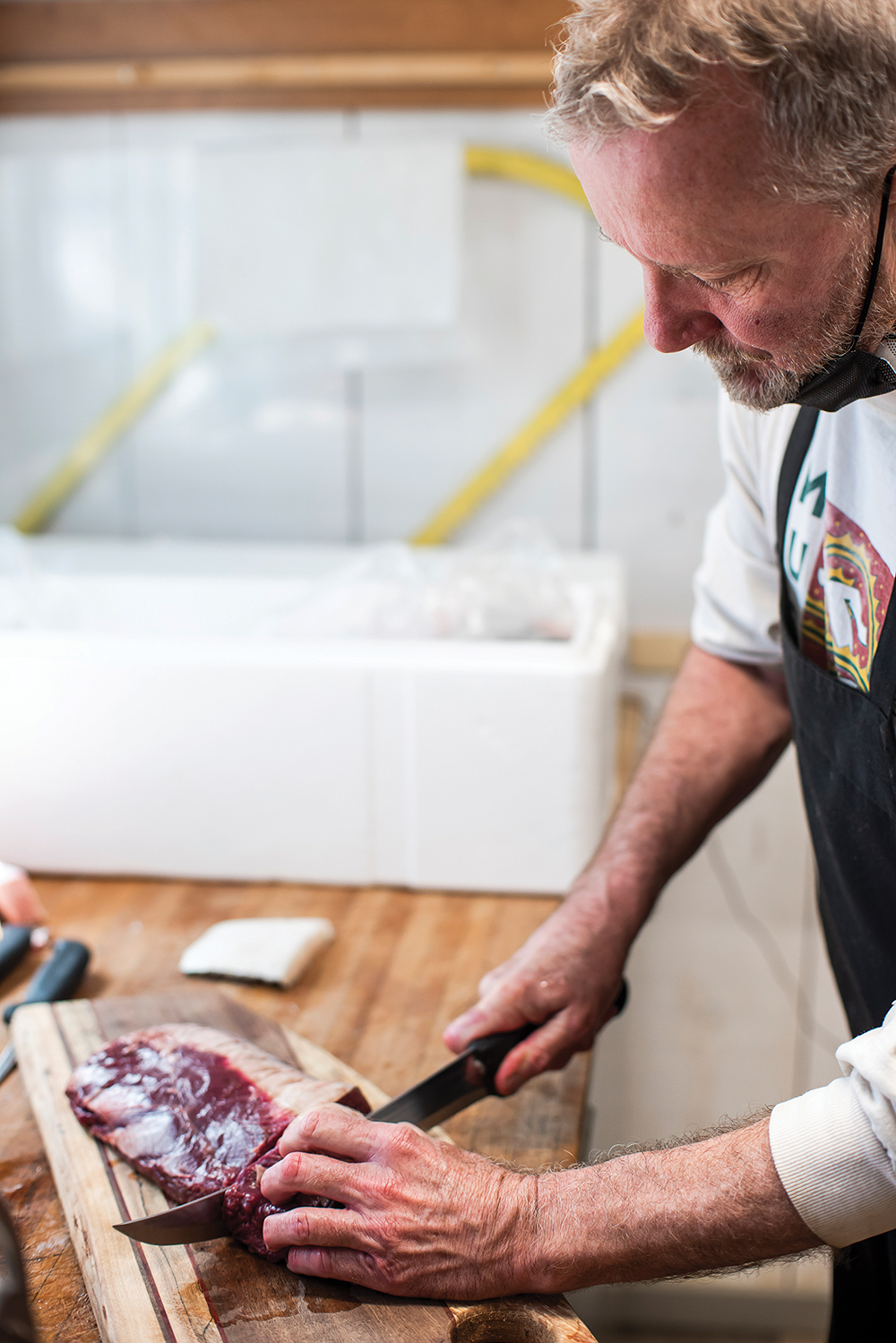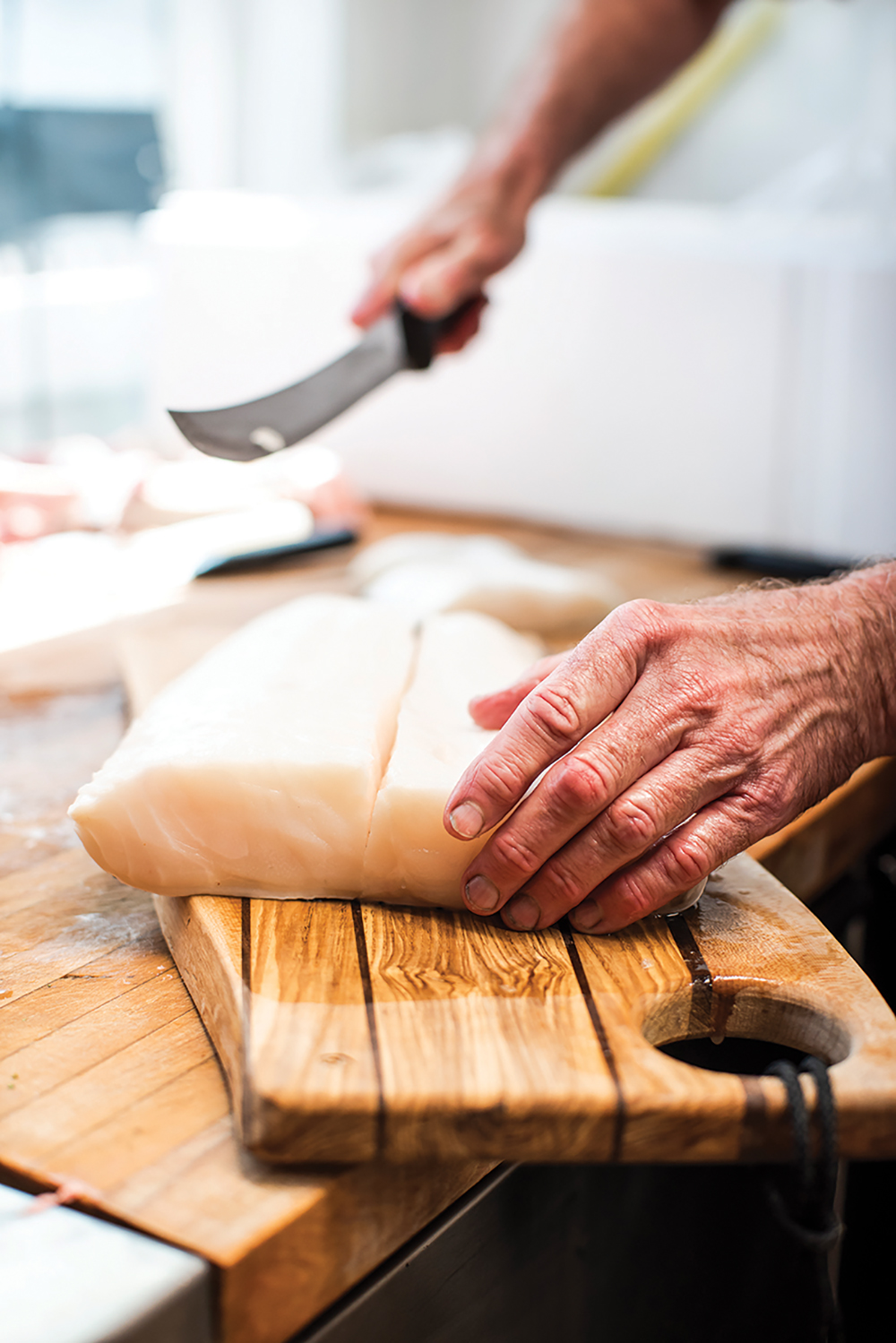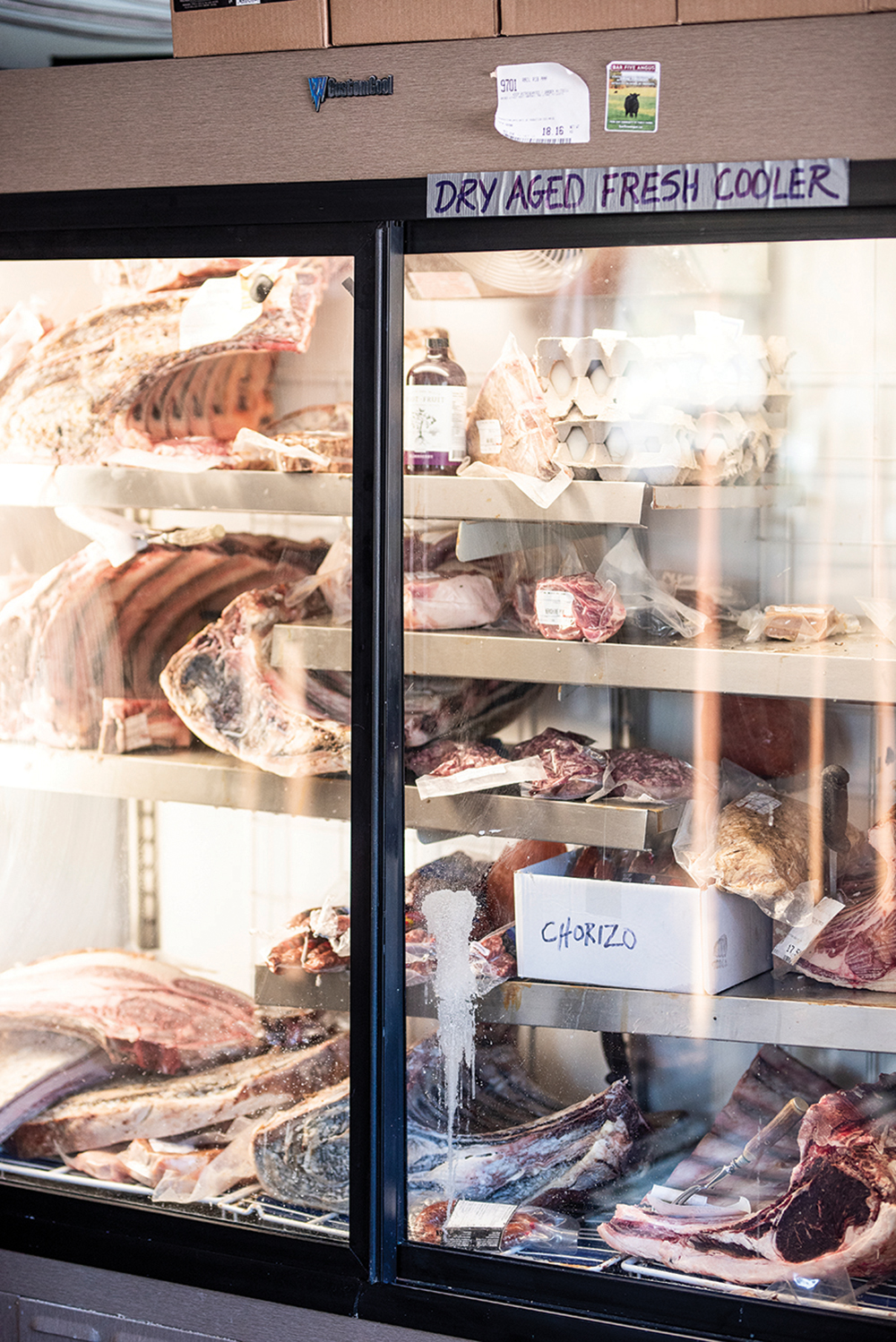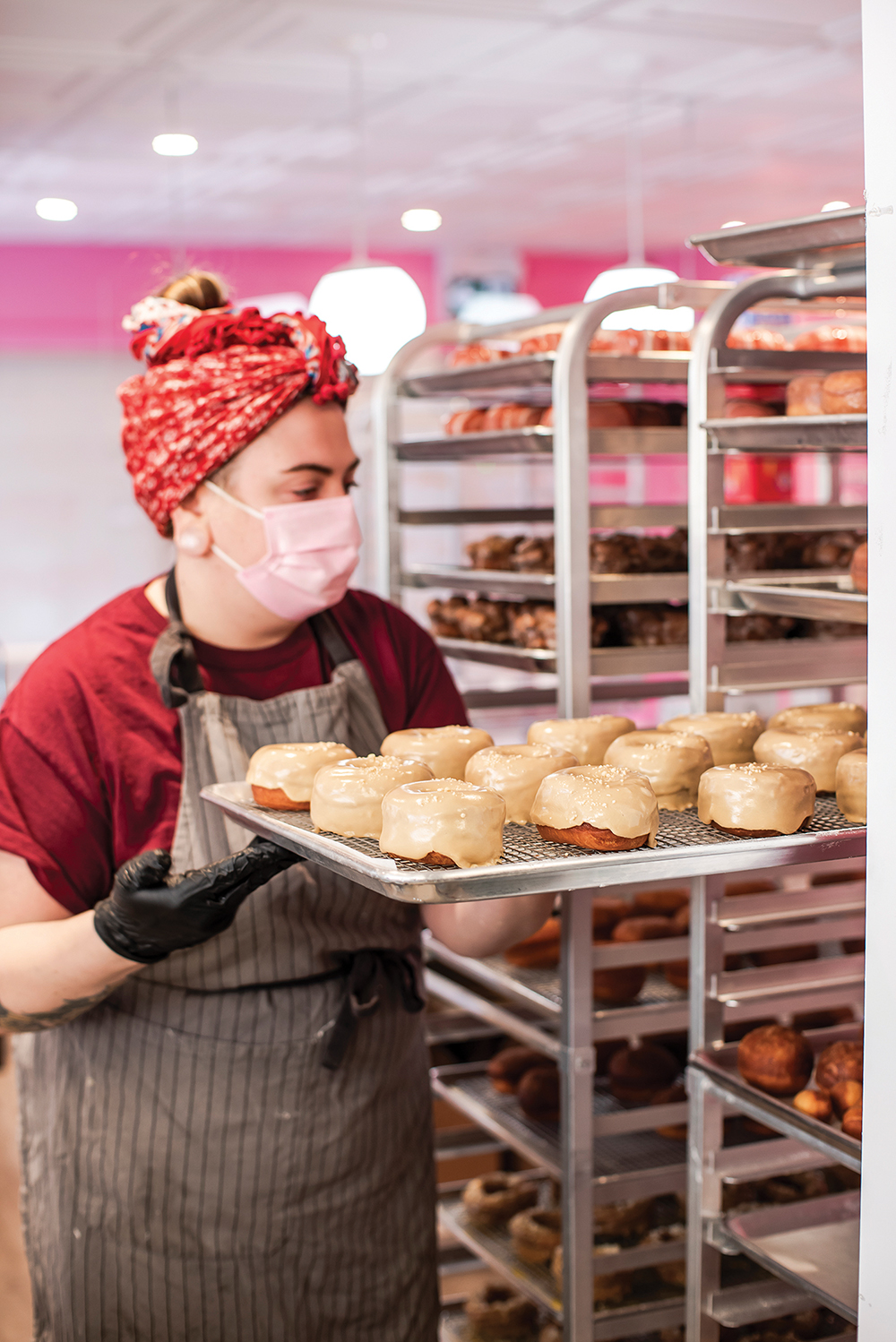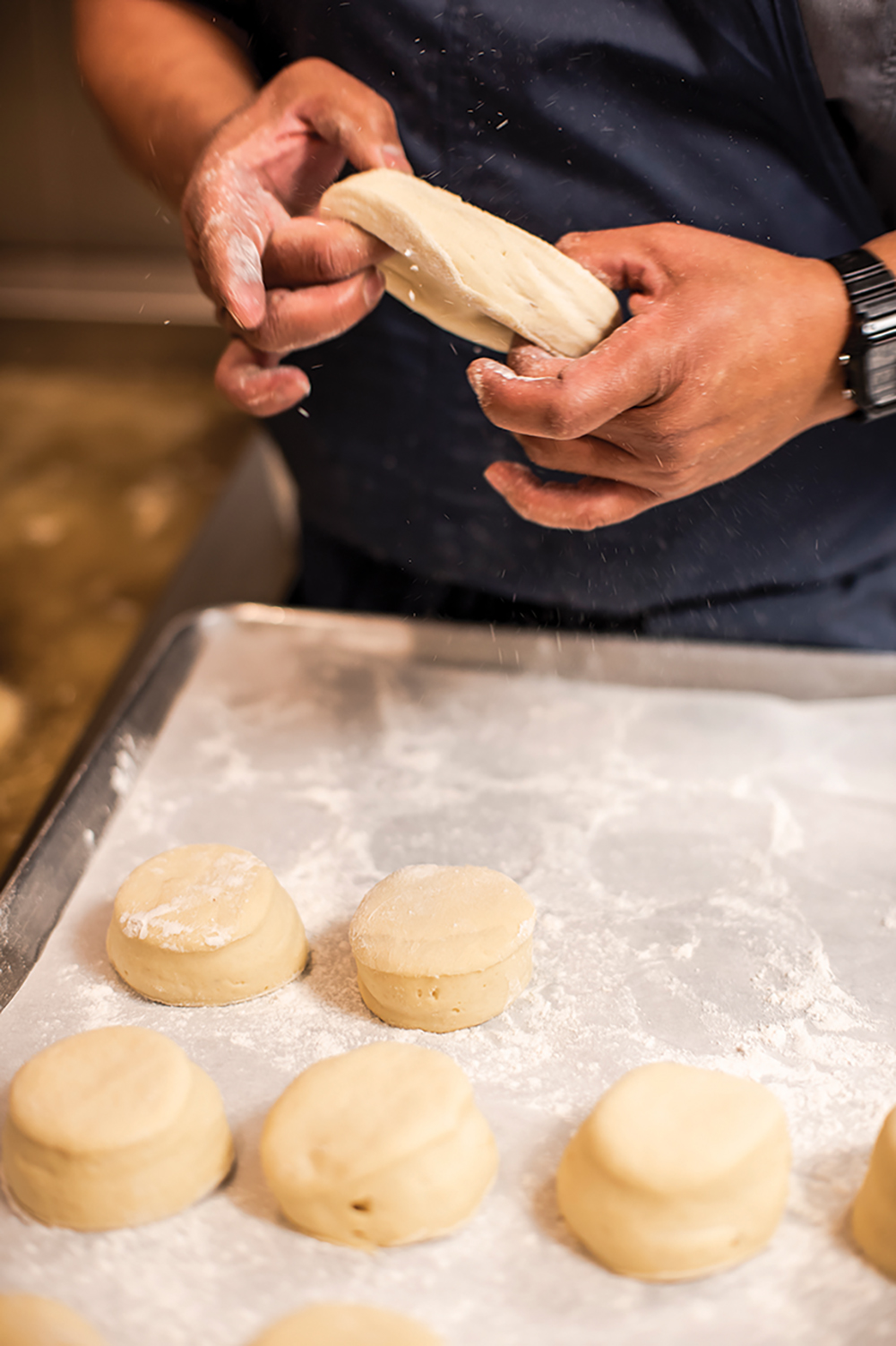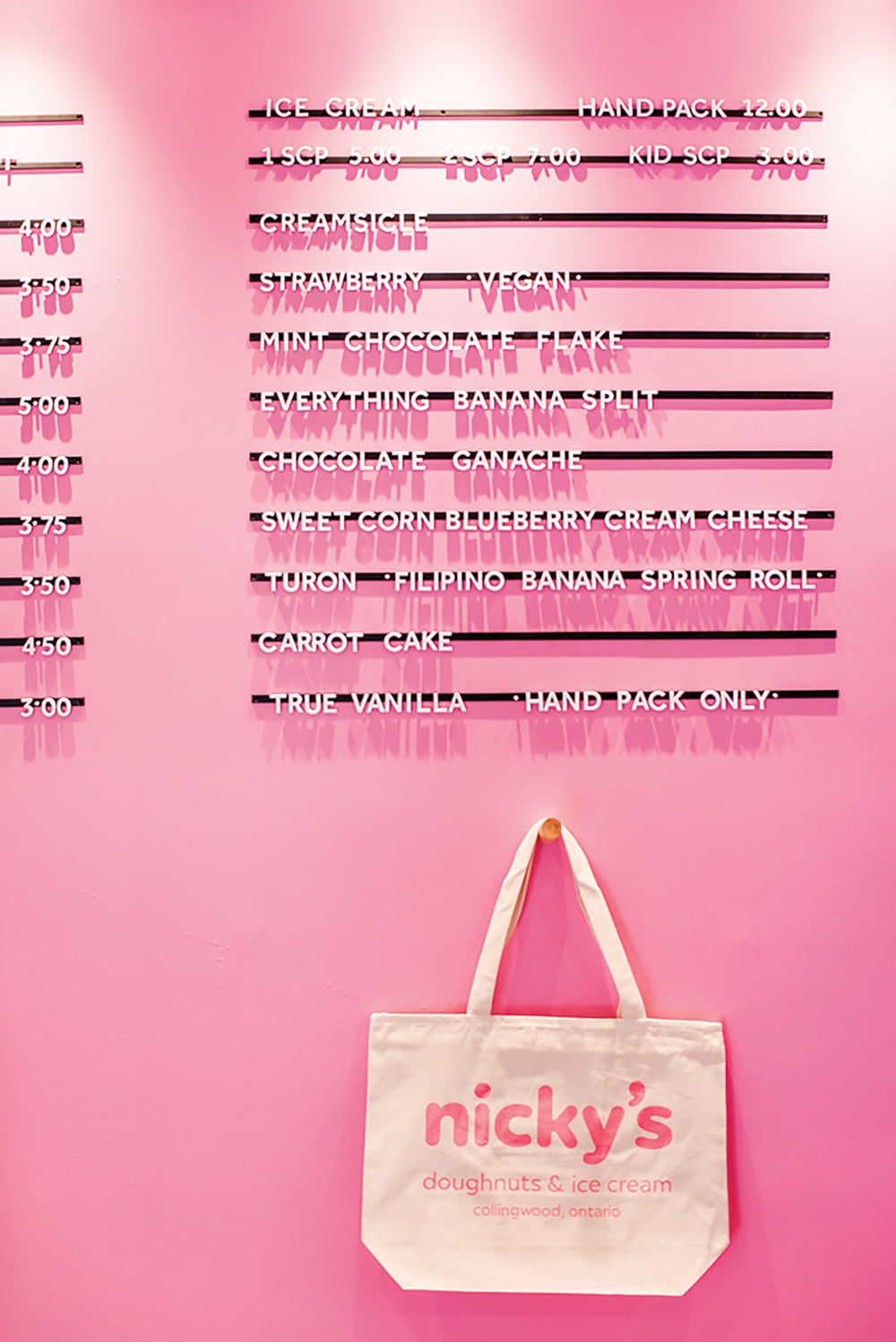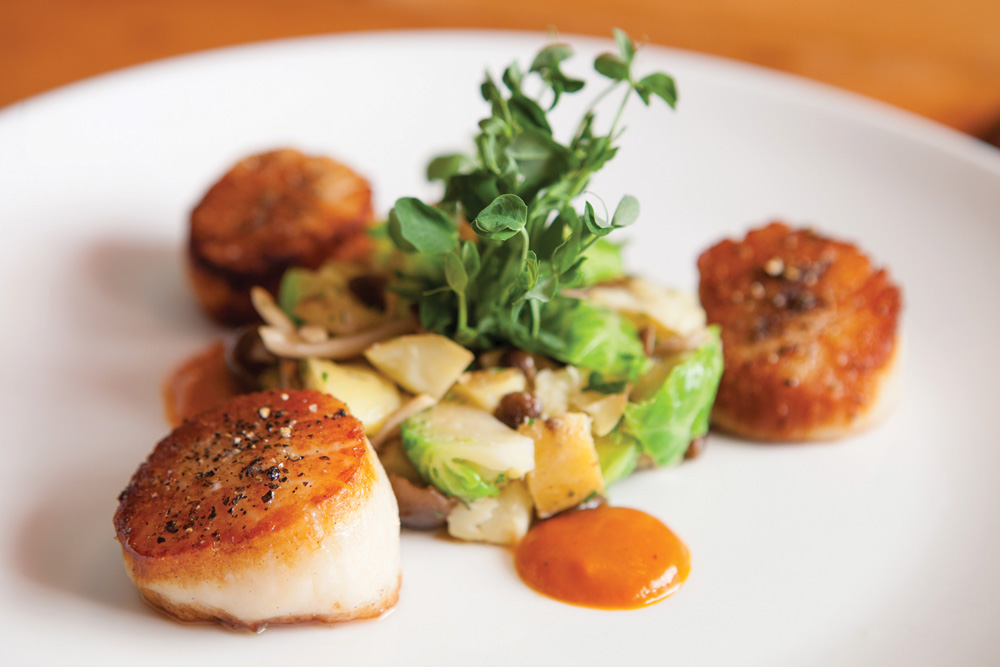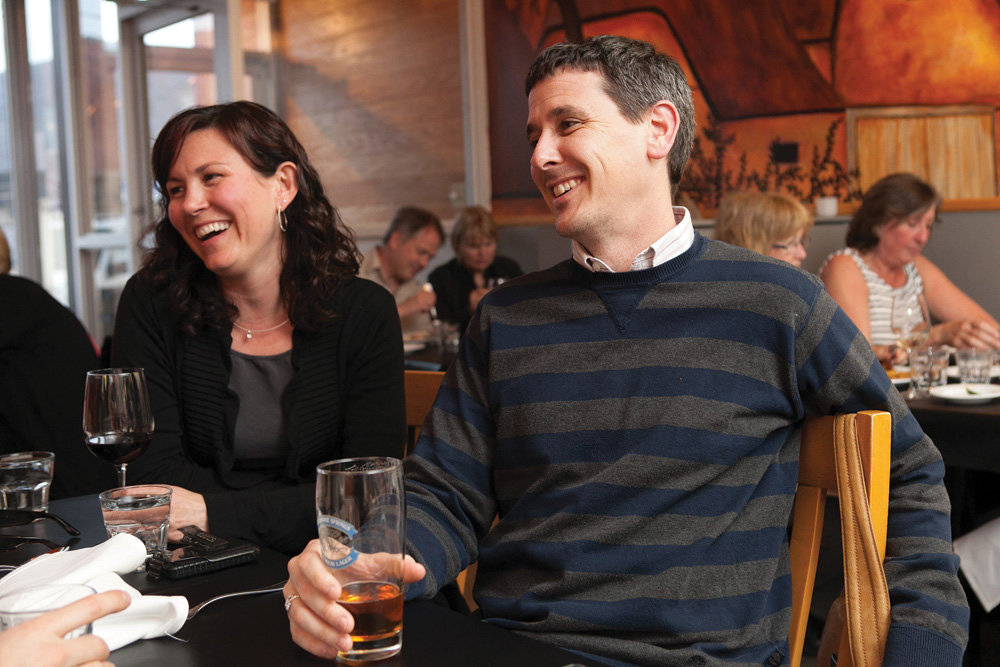How local restaurants, food businesses and beverage purveyors have pivoted, survived and thrived through challenging times
by Marc Huminilowycz, photography by Jessica Crandlemire
Since the beginning of the pandemic, many of us have longed for the days when we could get together with family and friends to leisurely enjoy a delicious, well-prepared and amiably served dinner in one of our region’s wonderful dining establishments. At the very least, growing tired of cooking meals or relying on fast food takeout, we crave variety and good “comfort” food during these stressful times.
Needless to say, the on again-off again pandemic restrictions and closures have caused havoc for most of our region’s businesses. But for restaurants and other providers of fresh and prepared food, struggling to maintain kitchen and server staff and juggling supplies of fresh food ingredients while complying with strict COVID protocols and capacity restrictions have been especially challenging. Some have closed permanently, while others have pivoted, survived and even thrived amid the COVID chaos.
As the owner of mycollingwood.ca, a well-established online community portal to local businesses, news and events in Southern Georgian Bay, Julie Card is solidly plugged into the local restaurant scene. “Our restaurants have had to continually pivot to adapt to ever-changing rules in a number of ways,” Card observes, pointing to reservation systems that limit the number of people in reception areas, short time slots, online contact tracing, widening product lines, operating with skeleton staff, and organizing efficient delivery.
Sadly, says Card, some well-established restaurants closed permanently due to the enforcement of capacity limits. Others, when allowed to open, chose to restrict dining patrons to locals only, a move that irked weekenders from outside the region but gained tremendous local support.
“A lot of our restaurants had staff that has worked together for years. It’s been difficult for restaurant owners to lay off people they consider part of the family,” notes Card. “Moving forward, restaurants will need to adopt more streamlined online reservation and ordering systems, and expand their food/market offerings if they haven’t already done so. Hopefully, patios will remain open this summer. Full credit to Collingwood and The Blue Mountains, who moved quickly last year to allow for the expansion of patios and patio applications valid for an entire year. And, with any luck, Collingwood’s annual Patiolicious event will be open.”
Although their doors have been closed and they have been restricted to pick-up and delivery throughout much of the pandemic, many of our favourite restaurants and fresh food providers have come to our culinary rescue. Here is just a sampling of what they are doing to make it possible.
Restaurants
The Curly Willow, which opened in Collingwood four years ago, is a family-owned neighbourhood eating establishment that has not only survived but thrived during the pandemic thanks to a combination of a fiercely loyal base of local customers and a small staff of mostly family.
“We count our lucky stars every day,” says co-owner and chef Linda Sloat, attributing her restaurant’s success to its simple business model. “Last year, we cut our staff from six to four people: me in the kitchen, my husband at the front of the house, my daughter serving and one other part-time staff member. There’s a general feeling that small restaurants won’t survive during COVID. You can if you have loyal customers, not a lot of staff to pay, plus the support of landlords and the government.”
On Valentine’s Day, The Curly Willow gave away free dinners for people who needed them, nominated by clients who, in turn, received gift cards. The restaurant offered takeout service for dinners only during the lockdowns.
“Who would have thought that people are buying filet mignon and salmon right now, but they are!” says Sloat, noting that as volume has decreased, the juggling of fresh inventory (mitigated in part by using local suppliers) and keeping staff interested in returning when things open up pose ongoing challenges.
As to the future, Sloat is crossing her fingers that patio dining will continue throughout the summer.
“There’s no COVID playbook, and I don’t know anything we could have done better. You just have to go with it, look after yourself, and look after others.”
Bruce Wine Bar in Thornbury, opened in 2011, has enjoyed a loyal following and consistent business over the years among locals, weekenders and tourists, offering (prior to the pandemic) two dining rooms, an impressive selection of wines, Tuesday corkage, open mic nights, lunches, dinners and catering. Last November, ownership of the restaurant was taken over by chef Shaun Edmonstone and local entrepreneur Nicole Paara.
“When COVID-19 hit in March, 2020, we closed for a couple of weeks, then a small group of us offered curbside pickup three days a week, increasing to five days a week last summer,” says Edmonstone. “We opened our Bodega bottle shop in the lower dining room, which helped us weather the storm by offering a large selection of wines and prepared meals, pre-mixed cocktails, and ‘grab and go’ lunches. Six months ago, we brought on a pastry chef to add to our menus.”
When the pandemic hit, Bruce Wine Bar needed to transition quickly from zero per cent to 60 per cent of sales from online orders. “We needed to switch our POS (Point of Sale) provider – a big investment,” says Edmonstone. “Today, things are on a different scale. Success now is a combination of strong online activity, drop-off catering, maintaining 10 full- and part-time staff, and keeping ahead of the price increases in our product supply chain, like vegetable oil that used to cost $19 per pail jumping to $32 per pail, and pizza boxes increasing from $15 to $21 per case.”
In order to adapt to the new lockdown reality, Bruce Wine Bar introduced a successful program of weekly pickup Meal Kits last January, with all preparation work done in their kitchen, leaving only one to two steps for patrons to cook and serve at home. “By offering a different meal every week, often with unexpected flavour profiles, our customers can bring a bit of Bruce home and enjoy a really good meal using Ontario products whenever possible,” says Edmonstone. One menu example featured Yellowfin tuna, ginger and tamari fried rice, carrot slaw, Ontario edamame, and Hawaiian wedding cake for dessert, with a wine pairing.
“Moving forward, we will continue our takeout program and bodega, and open dining when the time is right, focusing as always on community and ‘farm to table’ local,” says co-owner Nicole Paara. “Diversifying can hurt, but it can also help. Having more than one opportunity for revenue is vital. We want to be known for more than just a dining experience, sharing food and wine with people in many ways.”

“Diversifying can hurt, but it can also help. Having more than one opportunity for revenue is vital. We want to be known for more than just a dining experience, sharing food and wine with people in many ways.”
Nicole Paara, Bruce Wine Bar
Gilles Haché, a renowned chef with a big heart, has not only managed to survive during the pandemic but has also fed thousands of families in need across Grey County. Haché is owner and executive chef of Chez Gilles Fine Dining and Catering in Meaford, which offers traditional Acadian cuisine with a modern twist, East Coast fare and classic French-influenced fine dining.
Haché, who also does charitable work in food education, began his community service efforts in the early stages of COVID by distributing free bread out of his Aubergilles B&B in Eugenia. Seeing a greater need to feed people, he transitioned to preparing and delivering full meals – from 400 to 600 per week – to families in the region, supported by more than 40 volunteers who help with food preparation, packaging, administration and delivery (as of this writing, the donated meals were being offered bi-weekly).
According to Simon Newbold, Chez Gilles’ manager and maître d’, the costs for these meals – now in excess of 20,000 delivered, with a combined price tag of $100,000 – initially came out of Haché’s own pocket, but thanks to contributions from Grey County, local businesses, fundraising events and small donations at delivery points, the program is now breaking even.
As to the restaurant business, hours have been reduced, staff has been cut down to two, and menu items have been simplified. “The amount of work Gilles is still willing to put in is admirable, often working from 5 am to 9 p.m. seven days a week,” says Newbold. “Looking forward, Chez Gilles can normally seat up to 40 people. When we re-open, capacity will be 18 at best. We have to rely on the summer patio scene to take us to winter, but also offer takeout and delivery, an all-day lunch menu, fixed-price featured dinners Friday and Saturday, a takeout-specific menu, and an expanded selection of frozen prepared meals.”

“We have to rely on the summer patio scene to take us to winter, but also offer takeout and delivery, an all-day lunch menu, fixed-price featured dinners Friday and Saturday, a takeout-specific menu and an expanded selection of frozen prepared meals.”
Simon Newbold, Chez Gilles
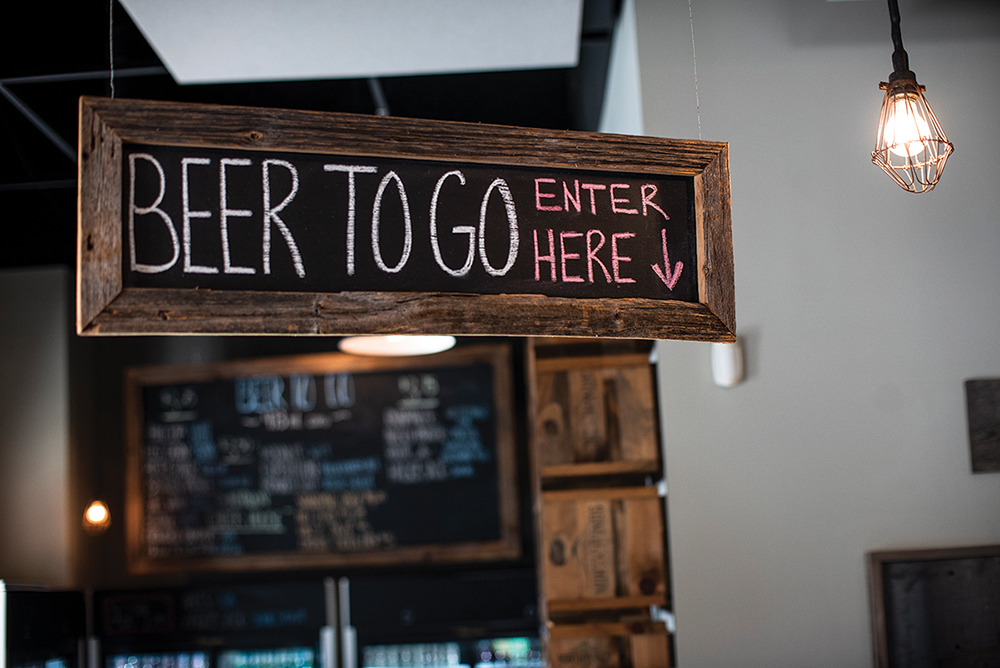
Beer, Cider & Food
“Let’s be honest, the pandemic sucks,” says Geoff Conway, founder of Northwinds Brewhouse & Kitchen, with upscale, family-focused pubs in Collingwood and Blue Mountain Village serving quality craft beers alongside seasonal, local foods.
“We’re grateful to have regular customers and fantastic local support, but we’ve lost a ton of business due to the closures as everyone has,” Conway adds. “But I’m thankful that, given our location in the province, there have been more months than not when we’ve been able to open, offering safe, secure dining, which carried us through the past year.”
Asked what types of challenges Northwinds has faced during the pandemic, Conway admits the answer is not simple. “From ensuring staff and guests are safe to managing staffing, to inventory issues, to deciding what to sell in-house and what travels well as takeout, to planning beer packaging (kegs or cans) – it’s been really complicated,” he says. “You have to fight every day to stay above water, thinking day and night, searching for new ideas to promote offerings and engage customers, knowing that all you can offer is curbside.”
Thanks to Conway’s ingenuity, Northwinds launched a number of measures to pivot and adapt to the COVID reality: an online beer store; switching its menu to an online ordering system with curbside pickup; modifying its lunch menu with reduced prices; offering “family feast” one-stop, complete family dinners; and introducing a new pizza concept, “Moto Pizza” – signature and “build your own” Detroit-style pizzas – which has been very successful.

“Let’s be honest, the pandemic sucks. We’re grateful to have regular customers and fantastic local support, but we’ve lost a ton of business due to the closures as everyone has.”
Geoff Conway, Northwinds Brewhouse & Kitchen
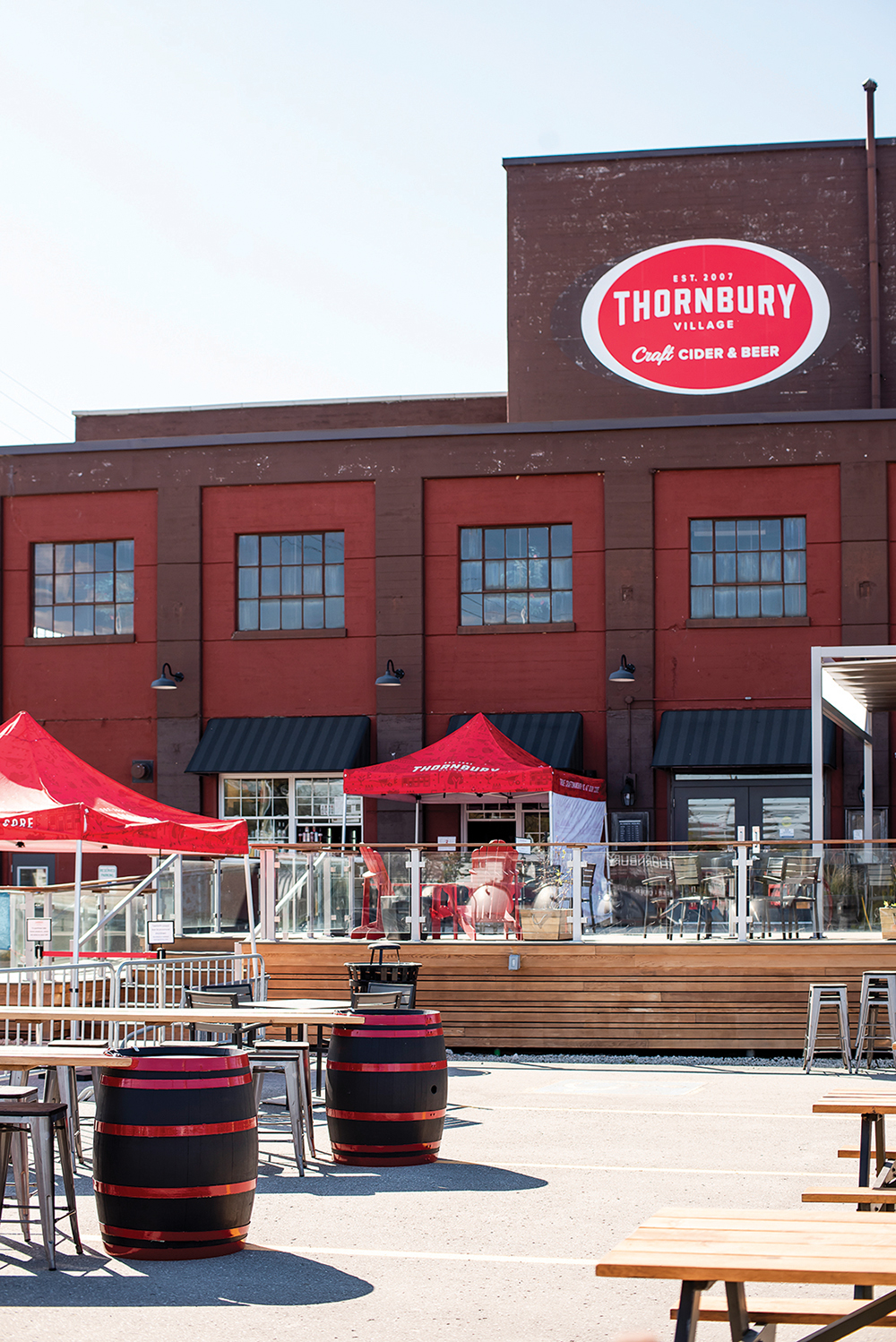
Driving through Thornbury over the past year, it was difficult to miss a collection of clear geodesic-shaped “igloos” on the patio of Thornbury Village Cider & Brew House. Over the past fall, patrons in the same “bubble” could gather to safely to enjoy refreshments and food, secure in the knowledge that staff were taking orders and serving them from outside each igloo and that each enclosed space was thoroughly sanitized and the air exchanged between customers – steps enacted in consultation with the Grey Bruce Health Unit.
“Our service model completely changed with COVID,” says retail and hospitality manager Derek Hammond. “Before, we had two separate indoor seating spaces and a retail area, with no table service. You ordered at the bar and brought your drinks and food to your table. When the pandemic hit, we closed off our tables and tap rooms and switched completely to curbside.”
In mid-June of last year, outdoor patios were allowed. “It was short notice but appreciated, and the town was very helpful. For Canada Day, we were allowed to extend our seating into the parking lot, with a retail tent on the deck,” says Hammond. Table service, with social distancing, was introduced, and a small selection of “nibble” menu items was offered to patrons.
“People really liked our table service model. It was eye-opening. As our food sales tripled and tips more than doubled, we realized that this is a better model for us, but being mindful of not competing with local restaurants,” he adds.
While most patrons were cooperative, Hammond admits that there were a few issues with the model from a seating/distancing perspective. Some patrons, like a large group of male cyclists claiming to be in the same social “bubble” and insisting on sitting together, tried to bend the rules. And there were lineups, an inconvenience the cidery tried to minimize by giving out free bags of Kettle Chips and hiring live musical entertainment.
“It’s been a year of learning and a constant evolution of figuring out where things are going to go, but it’s a smooth process now,” says Hammond, who looks forward to offering patio service this summer. “You make plans, but rules change. The pandemic has fine-tuned our ability to be adaptive. All you can do is make an educated guess, adjusting as you go along, and make it work safely for us and our guests.”

“You make plans, but rules change. The pandemic has fine-tuned our ability to be adaptive. All you can do is make an educated guess, adjusting as you go along, and make it work safely for us and our guests.”
Derek Hammond, Thornbury Village Cider & Brew House
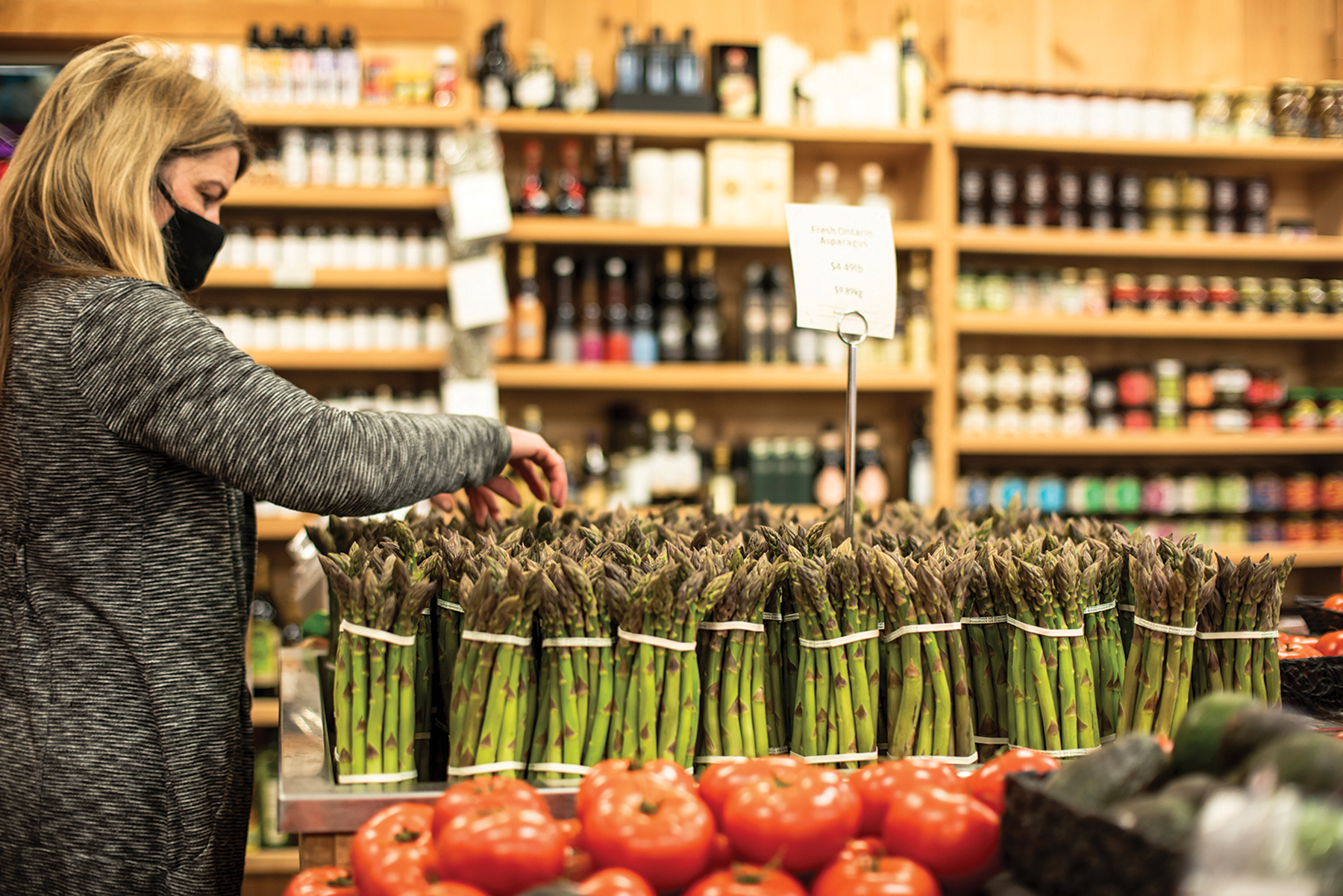
Fresh & Frozen Food Purveyors
When Debby and Kyle Oakley took over Goldsmith’s Orchard Market on the western end of Thornbury in 2013, the business was a seasonal market. Today, it is a very successful year-round enterprise offering fresh, local fruit and vegetables, fresh baked goods, frozen meats and entrées, and more.
Like other food businesses, Goldsmith’s was impacted by the pandemic, although not in a completely adverse way. In the beginning, faced with overloaded phone lines and dozens of emails daily from hungry customers, with resulting inventory shortages, the market was forced to quickly adapt to online shopping – no easy task with over 4,000 products on offer, some subject to fluctuating market conditions.
“Thankfully, we’re now fulfilling 95 per cent of what our customers are asking for,” says Debby Oakley. “The way people are shopping has changed. There’s no more shopping for small orders. People are stocking their freezers, and demand for frozen entrees is huge.” Where people used to shop often for a few items, they are now limiting their visits and buying more, she observes.
To ensure a comfortable in-store shopping experience for patrons, Goldsmith’s is keeping capacity lower than required under the rules – four to six people at a time. “We stand in line to experience what our customers are experiencing, and we’ve installed a wireless traffic light at the door, controlled by cashier staff, so they don’t need to keep an eye on the door,” Oakley adds.

“The way people are shopping has changed. There’s no more shopping for small orders. People are stocking their freezers, and demand for frozen entrées is huge.”
Debby Oakley, Goldsmith’s Orchard Market
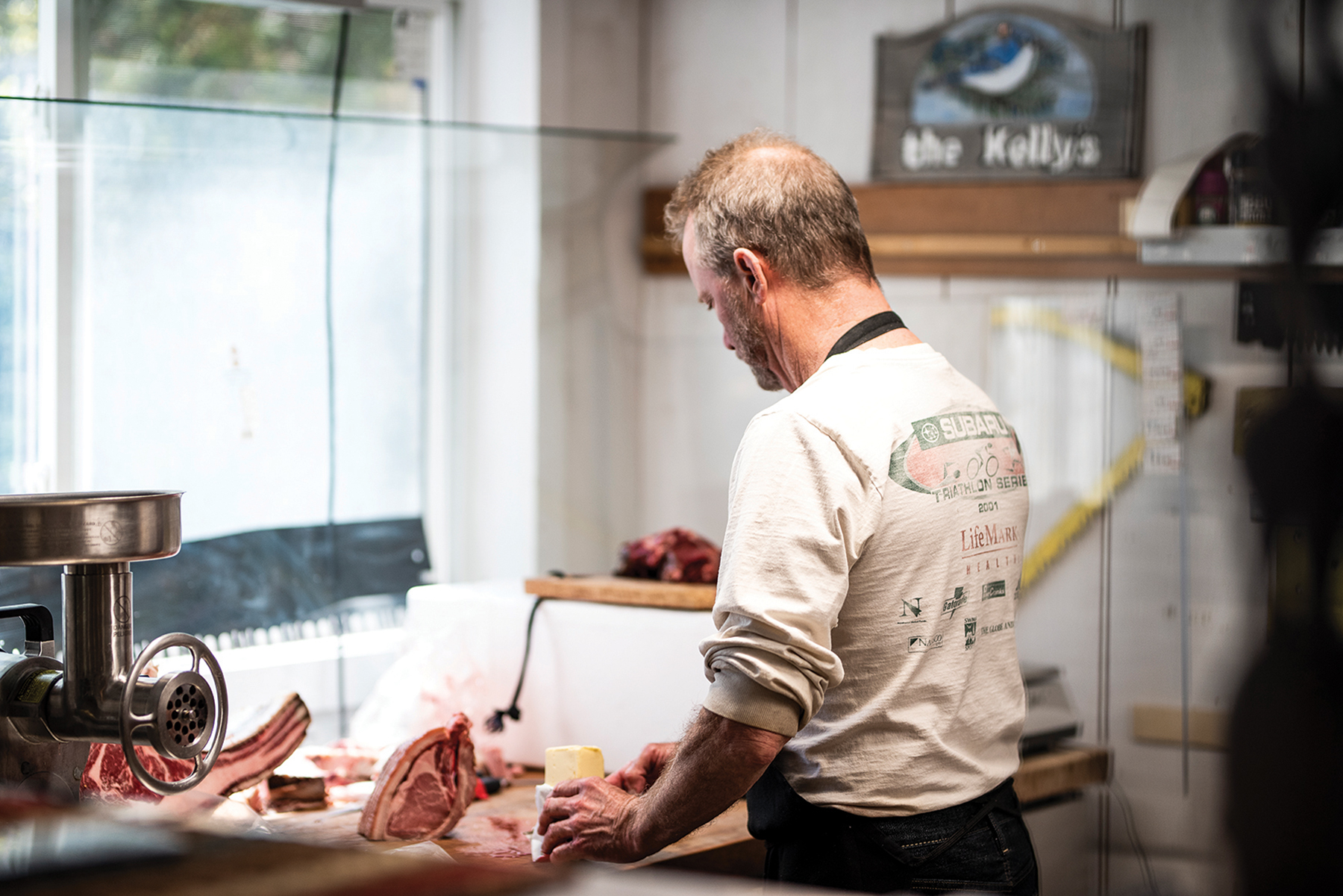
Like Goldsmith’s, Black Angus Fine Meats & Game in Craigleith has continued to do well despite the pandemic. Drawing from a loyal client base of local residents and weekenders, it is a small, personalized butchery that specializes in made-to-order cuts of meat as well as frozen and prepared foods.
“Our philosophy is that people need to eat three times per day, so you want to make sure you have what they need,” says owner Sean Kelly. “You’re not fooling anyone. Many of the people here are from the city. They demand world-class product and prefer to get it here instead of bringing it up with them. My customers have my cell number. They just call me and place their order for the cuts of meat they want.”
Kelly sees the COVID culture as more than just a short-term phenomenon. “People are home a lot more, and they’re learning to cook again,” he says. “If you’re living in a $2-million home, why not make the best of it?”

“Early that first morning, our phones were going ding, ding, ding, but we were all sold out of donuts before opening. From that time on, it’s been strictly lineups and walk-in.”
Caesar Guinto, Nicky’s Doughnuts & Ice Cream
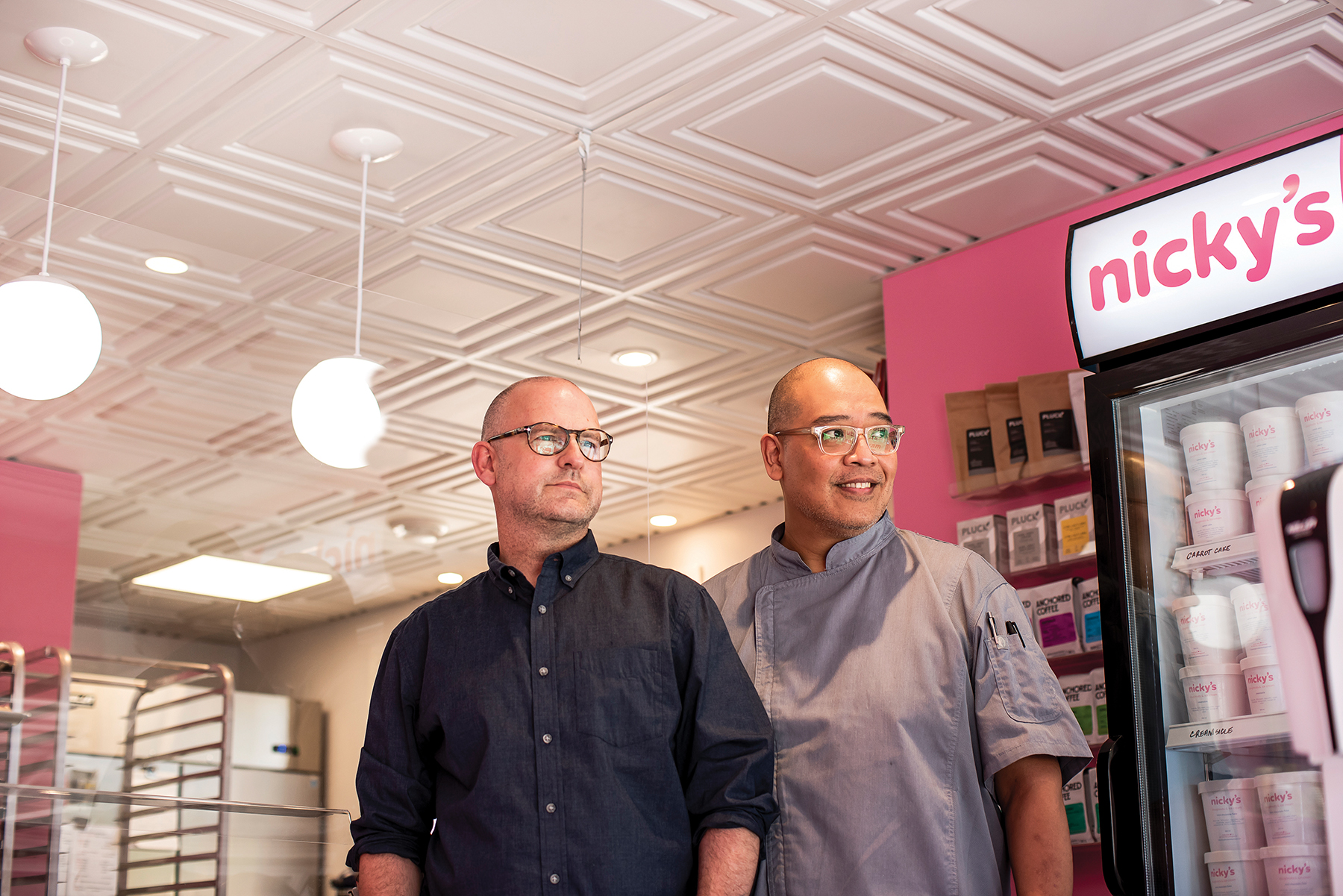
Takeout Treats
Eating “healthy” food is important, especially in these stressful times. But some days we need a treat that lifts our spirits, and during the pandemic many of us increased our intake of everything sweet, creamy or doughy. Enter Nicky’s Doughnuts & Ice Cream in Collingwood, an enterprise that opened last January in the dark, wintry days of the pandemic with an enticing tagline: “Come on get happy!”
Founded by Caesar Guinto, executive chef, and Sam Holwell, general manager of Black Bellows, who found themselves laid off when COVID-19 forced the shutdown of the eating establishment, Nicky’s was an inspiration born out of adversity.
“We did a lot of thinking about the food and beverage industry,” says Guinto. “We used to own Creemore Kitchen, where we worked long hours, and realized that, if we’re going to put in the effort, we should open our own thing. We had moved to Collingwood last October and liked the urban vibe. So we looked at what was missing here and realized that we could open a place selling hand-made donuts and ice cream, which we perfected in Creemore.”
After 10 months of planning how their shop would look and experimenting with different flavours, Guinto and Holwell opened Nicky’s on Third Street near Hurontario. “At first, we had doubts and thought, ‘who the hell is going to buy this stuff?’ ” recalls Holwell. “We had an online platform set up and promoted the shop via Instragram. Our donut doughs are made the day before and sit overnight for better flavour, and we fry them in the morning.”
Guinto picks up the story: “Early that first morning, our phones were going ding, ding, ding, but we were all sold out of donuts before opening. From that time on, it’s been strictly lineups and walk-in.” Nicky’s best-selling ice cream is a Filipino favourite containing sweet corn, blueberry and cream cheese. Carrot Cake ice cream and Everything Banana Split are also popular. “We’re in awe and totally humbled seeing the lineups outside our door,” Howell adds.
The pandemic, now in its second year, has dramatically changed the way we live, work, play, and eat. Gone are the days, for now at least, of breaking bread with family and friends in a favourite restaurant, being served at our table with a friendly smile, with no clean-up afterwards. As we cook like never before, we look forward to an occasional respite with a dash of exotic flavour or a comforting treat. Fortunately for us, local restaurants and fresh food shops have responded to our culinary desires, and we are hungrily supporting them in return. ❧






